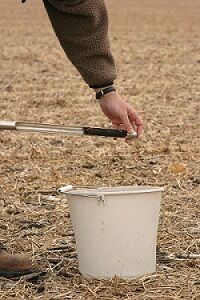Fall is always a good time for soil tests, and following the hot, dry summer of 2021, this is also a good time to test for soybean cyst nematode.
“Soybean cyst nematode, unfortunately, loves hot, dry soil so I am expecting higher than ever numbers from fall samples,” said Greg Tylka, professor in plant pathology and microbiology at Iowa State University.
SCN is a small, unsegmented plant-parasitic roundworm that attacks the roots of soybeans.
The nematode is the most economically significant pest of soybeans in Iowa and has been found in all 99 Iowa counties, according to Iowa State University Extension and Outreach. Infested soybean plants often show no symptoms other than reduced yield.
In a recently updated publication called “Interpreting SCN Soil Sample Results,” Tylka covers the basics of testing soil for soybean cyst nematode and how to interpret the results.
Soil samples can be collected from fields in which soybeans were grown this season to relate SCN numbers to 2021 bean yields. Samples should be collected from harvested corn fields in which soybeans will be grown in 2022 to determine what the nematode population will be for next year’s soybean crop.
The soil sample results may cause farmers to alter their plans for the 2022 crop, according to Tylka. The publication explains how to compare results across different years and from different labs, why SCN soil sample results can be so variable and provides advice on how to deal with variability.
Usefulness of the sample results is dependent on the quality of the soil samples, and finding low numbers of SCN does not necessarily mean that an infestation doesn’t exist.
“Thinking you have a little bit of soybean cyst nematode is just fooling yourself,” said Tylka. “Any level of SCN is worthy of management.”
The Iowa State University Plant and Insect Diagnostic Clinic processes soil samples for SCN, as well as several private soil laboratories throughout the state.
Learn more about SCN and its impact across soybean-producing states on the Soybean Coalition website.
For more information, Tylka can be reached at 515-294-3021 or [email protected].


